On the afternoon of October 26, discussing the draft Law on Electricity (amended), National Assembly deputies (NADs) in Group 15 (including the provinces of Yen Bai, Quang Tri, Binh Thuan, Binh Phuoc) proposed that there should be a policy clearly regulating the development of electricity in rural areas, ethnic minorities, mountainous areas, border areas, islands, and disadvantaged areas. The recent storm No. 3 caused severe damage in 26 northern provinces, including many mountainous provinces and ethnic minority areas. This will directly affect the implementation of the National Target Program on Sustainable Poverty Reduction. Therefore, National Assembly deputies suggested that the Government should have a more thorough assessment of poverty reduction in this region. Prime Minister Pham Minh Chinh and his wife will visit the United Arab Emirates (UAE), the State of Qatar and the Kingdom of Saudi Arabia from October 27 to November 2. Dong Nai has more than 50 ethnic groups living together, with a population of about 3.2 million people, of which ethnic minorities have nearly 200,000 people (accounting for 6.42% of the province's population). With cultural diversity, the traditional costumes of the ethnic groups in Dong Nai province are also different and colorful. To proactively respond to storm No. 6 (storm TRAMI) moving ashore, the Border Guard of Thua Thien Hue province mobilized officers and soldiers to coordinate with local authorities and forces to overcome coastal erosion and deploy response plans. Marriage and family relationships are important relationships, creating the cultural identity of indigenous peoples in Lam Dong. Through traditional cultural values such as customary law, to remind, adjust, control, contribute to building a healthy and sustainable marriage and family life, creating a harmonious and gentle life in the communities of villages in the Central Highlands. Going all the way down the steep, winding road of 13 km, each house gradually appears. Po Yau village (Lo Pang commune, Mang Yang district, Gia Lai) is hidden deep in the old forests, perched on a towering mountain range. The village is named after Po Yau stream in the primeval forest like a muse with romantic and majestic beauty. The recent storm No. 3 has caused severe damage in 26 northern provinces, including many mountainous provinces and ethnic minority areas. This will directly affect the implementation of the National Target Program on Sustainable Poverty Reduction. Therefore, National Assembly deputies suggested that the Government should have a more thorough assessment of poverty reduction in this area. The implementation of Project 8 "Implementing gender equality and solving urgent issues for women and children" under the National Target Program on socio -economic development in ethnic minority and mountainous areas for the period 2021 - 2030, Phase I: From 2021 - 2025 in Duc Co border district has initially brought positive results in eliminating gender prejudices and gender stereotypes in ethnic minority areas. From there, helping women and children rise up and affirm their role as subjects in the family and community. The Civil Aviation Authority of Vietnam has just sent a document to the Vietnam Air Traffic Management Corporation; International Airports: Da Nang, Phu Bai; Airports: Dong Hoi, Chu Lai; Northern and Central Aviation Administrations on the temporary suspension of receiving and operating aircraft due to the impact of storm TRAMI. To promote the consumption of agricultural products and handicrafts of ethnic minorities, Nam Dong and A Luoi districts (Thua Thien Hue) have maintained highland markets on weekends and at the end of the month. The markets are not only a place for people to exchange and sell goods, but also a highlight in the development of local tourism. The 2024 Nghe An Ethnic Minority Folk Performing Arts Festival has come to an end. The community did not discuss much about the titles that the teams achieved from the evaluation of the Organizing Committee; what remained in the feelings of each witness was that the cultural identity of each ethnic group is increasingly shining; being better preserved and promoted; becoming a sacred heritage for future generations. That is also the source of culture that flows forever with the eternal development of each ethnic group on the land of Nghe An. On the afternoon of October 26, discussing the draft Law on Electricity (amended), National Assembly deputies (NADs) in Group 15 (including the provinces of Yen Bai, Quang Tri, Binh Thuan, Binh Phuoc) proposed that there should be a policy clearly regulating the development of electricity in rural areas, ethnic minorities and mountainous, border, island and disadvantaged areas. On the afternoon of October 26, the National Assembly continued to discuss in groups about the socio-economic development situation. Speaking at Group 13, National Assembly Chairman Tran Thanh Man said that the workload of the National Assembly at this Session is very large, requiring the National Assembly to work more actively, promptly removing difficulties and obstacles in the socio-economic development of the country in the spirit of "wherever it is difficult, we will solve it".
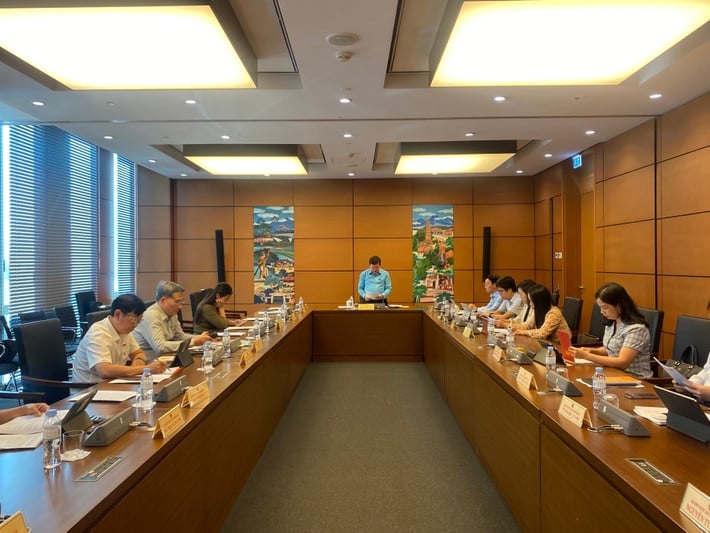
National Assembly Deputy Dieu Huynh Sang (Binh Phuoc) said that after 20 years of implementation and 4 amendments and supplements to a number of articles, the Electricity Law has created a legal framework for electricity activities and electricity use, meeting the needs and contributing to promoting socio-economic development.
In order to facilitate the development of power sources and grids to meet the people's increasing demand for electricity, contributing to ensuring national defense, security and safety; including promoting the development of renewable energy and new energy in line with the country's development, amending the Electricity Law is very necessary and urgent.
Delegate Dieu Huynh Sang suggested continuing to review the scope and subjects of adjustment to meet the viewpoints and objectives of the law amendment requirements, comply with the Constitution and international treaties; specify the state's policy on electricity development to ensure feasibility, consider the fields where the state has exclusive investment, only regulate the contents to ensure energy security, create a mechanism to attract socialization, and reduce public investment.
Along with that, it is necessary to consider supplementing planning management and policies for energy conversion; the type of "electric energy storage", "energy security storage technology". The development of electric vehicle charging stations, the safety of electrical equipment at electric vehicle charging stations to meet the requirements of state management for the increasingly developing type of electric vehicle stations, as a basis for implementation when the Electricity Law (amended) is passed.
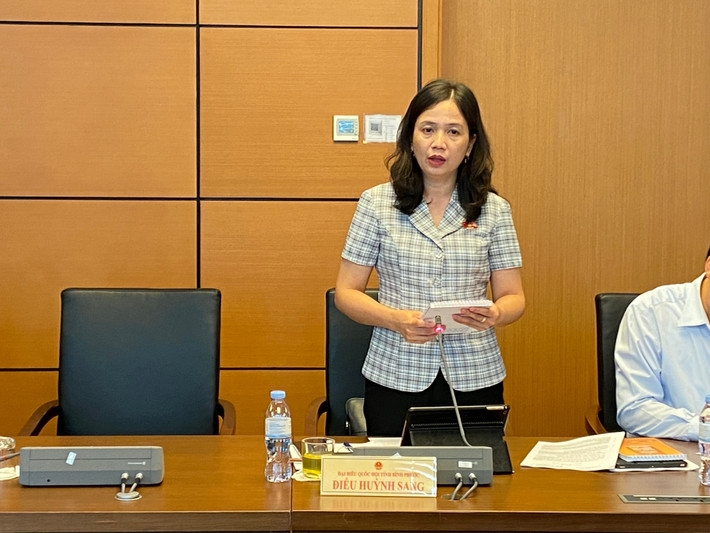
At the same time, it is necessary to review and clearly and specifically define the scope of planning adjustment and the plan for implementing the planning. There is a mechanism to handle slow-progressing power source projects. Investment in construction of power projects and works; projects using all or part of public investment capital. Investment in construction of emergency power projects.
In addition, delegate Dieu Huynh Sang also emphasized that the Electricity Law project (amended) should have policies clearly regulating electricity development in rural, mountainous, border, island and areas with especially difficult conditions.
Sharing the same view, National Assembly Deputy Nguyen Thanh Trung (Yen Bai) said that the State's policy on electricity development in Article 5, Point a, Clause 3 stipulates the policy on electricity development in rural areas, ethnic minorities, mountainous areas, border areas, islands and areas with particularly difficult economic conditions; in which, Point a stipulates that the State prioritizes public investment capital from the State budget, suggesting that it is necessary to consider removing the phrase "State budget" or rewriting "investment capital from the State budget" to ensure consistency in the draft law.
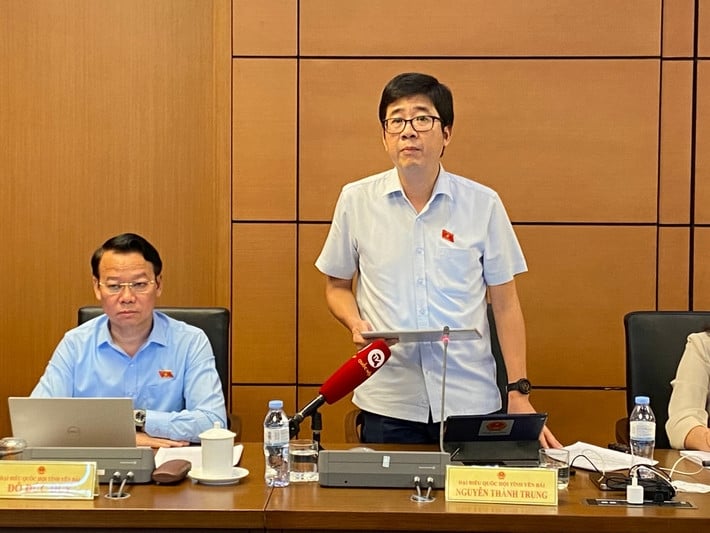
At the same time, developing electricity in rural areas, ethnic minorities and mountainous areas requires specific policies. In fact, in mountainous provinces, the power grid system runs through natural forests, making it difficult to implement projects; in addition, there are also policies to support attracting production and business establishments to invest in mountainous areas, especially policies on electricity prices.
National Assembly Deputy Hoang Duc Thang (Quang Tri) raised the issue that this law must address the big question: promoting a competitive, transparent, fair, and efficient electricity market, and electricity prices must approach market mechanism prices. This is the core and the most desired thing of the business community and the people.
In that spirit, the delegate suggested that it is necessary to study some specific contents.
Accordingly, in Article 84 on the rights and obligations of electricity customers, the current provisions on rights in this article are still general and difficult to implement, such as: Point b, Clause 1 "Request the electricity seller to promptly restore the power supply after a power outage"; Point c, Clause 1 "Be compensated for damages caused by the electricity seller according to the provisions of law".
The contract between the electricity seller and the electricity customer is a civil contract. When the electricity customer suffers damage, he must prove that the electricity seller is at fault. With a rather complicated electricity transmission system from the source to the user, it is very difficult for the electricity user to prove the fault at which stage and to request which agency is responsible for compensation. Therefore, delegate Hoang Duc Thang suggested that it is necessary to study, adjust, and supplement to clarify these regulations.
Regarding Chapter V on electricity prices, in Articles 86 and 87, it is proposed to study, review, supplement, and clarify that electricity prices are “pricing methods (formulas)” to sell electricity directly to electricity users. Delegate Hoang Duc Thang said that this is another pressing issue for electricity buyers over the past years; electricity prices are always increasing, there is no transparency in the way prices are calculated, and there is still a monopoly in the electricity industry.
Regarding Chapter VII on safety of hydroelectric works, the delegate also pointed out that the draft law only stipulates measures and responsibilities for safety of dams and hydroelectric reservoirs; but does not stipulate responsibilities and handling of responsibilities due to the subjectivity of the management and operation agencies of dams and hydroelectric reservoirs for water discharge and dam breakage, causing damage. This is a reality that has occurred, and the drafting agency is requested to study, supplement and clarify.
Source: https://baodantoc.vn/quoc-hoi-quan-tam-den-viec-phat-trien-dien-vung-dtts-vung-kho-khan-1729958028078.htm







![[Photo] Prime Minister Pham Minh Chinh chairs conference on anti-smuggling, trade fraud, and counterfeit goods](https://vphoto.vietnam.vn/thumb/1200x675/vietnam/resource/IMAGE/2025/5/14/6cd67667e99e4248b7d4f587fd21e37c)
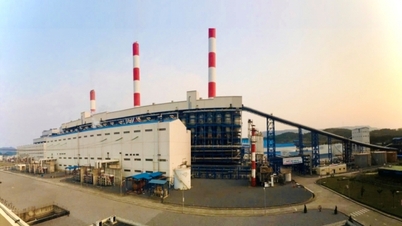

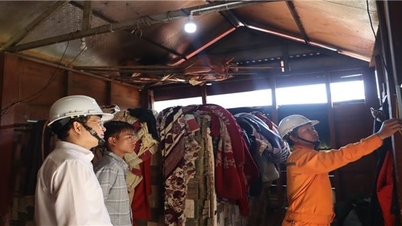






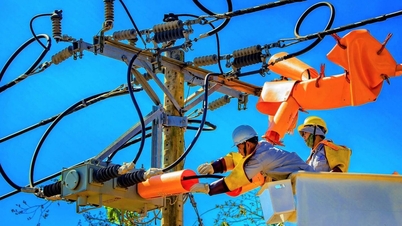
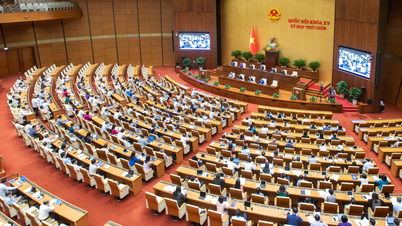

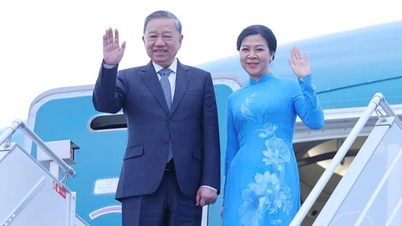


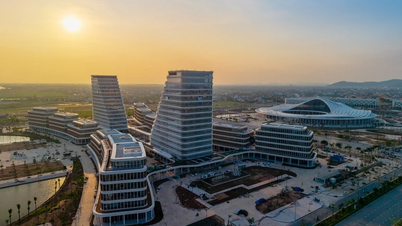














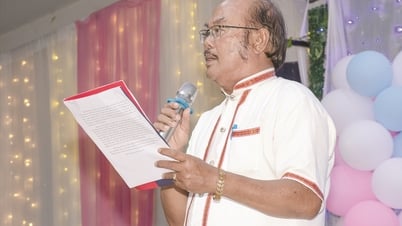














































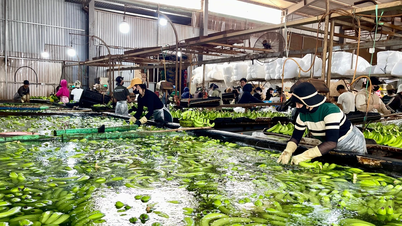

















Comment (0)